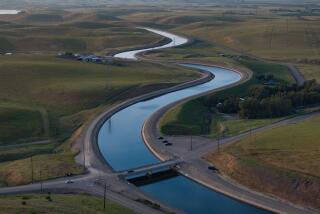Editorial: The feds can curb a foolish California water giveaway

- Share via
About 15 miles north of Fresno sits Millerton Lake, a reservoir created in the 1930s when the U.S. Bureau of Reclamation built Friant Dam on the San Joaquin River. The dam provides irrigation water for fields and groves in much of the San Joaquin Valley, but it wiped out the Chinook salmon migration that had existed on the river for tens of thousands of years.
It also threatened the rights of landowners to divert naturally flowing San Joaquin River water for their fields. Instead of losing their rights, though, farmers who had land near the river agreed to trade their water to the federal dam project in exchange for “substitute water,” delivered to them from the Sacramento River.
This is one of several big water agreements, known as settlement or exchange contracts, that swapped water rights in order to permit construction of large projects in the 20th century, including the federal government’s massive Central Valley Project of dams, canals and aqueducts. In addition to the San Joaquin agreement, there are similar contracts for projects on the Sacramento and Feather rivers.
When the contracts were signed, California was a lush state with a seemingly endless water supply. Today, though, the state is increasingly arid, and the state and federal agencies that manage water projects have sharply reduced or cut off supplies for most growers and cities.
Yet under the San Joaquin exchange contract, four irrigation districts are together getting, on average, more water than the city of Los Angeles uses in a year. In fact, they’re getting more water than they would have gotten if the dam had never been built and they were still relying on the natural flow of the San Joaquin River. This year the Sacramento River can’t currently supply all the “exchange” water they’re promised, so now they’re also getting more water from Millerton Lake. So in a sense, they’re getting back some of the water they agreed to give up, in addition to the water they agreed to give it up for.
That’s quite a contract.
Meanwhile, a section of the San Joaquin River has run dry, despite a 2006 legal settlement that required enough Millerton Lake water to be released to permit the salmon to again migrate, at least for part of the journey. The problem is that there’s no room in the river channel to both send water farther downstream and send it to the exchange contractors.
There is one bit of good news. The San Joaquin exchange contract includes an optional renegotiating period that opens once every five years, allowing the terms to be reset to keep up with changing conditions in the state. Climate change and persistent drought certainly seem to qualify as changing conditions.
The period is currently open, but it closes Tuesday, so the Biden administration had to trigger renegotiations, or be stuck for another five years with a contract that locks in unreasonable uses of California’s diminishing water supply. Late last week, it finally acted.
The renegotiation window is one example of how inequities, and legal frameworks created under wetter conditions, can and should be rectified under the state’s existing system of water rights.
That’s important, because in a drier California, water is becoming increasingly precious. Why, Californians might ask, when most of us have to conserve, should someone be able to use up big chunks of the state’s supply to grow even more almonds and pistachios simply because their great-grandparents grabbed river-adjacent land from Indigenous people? The answer is generally that water rights are property rights and are protected under the 5th Amendment, which requires government to pay compensation for taking private property for public use.
But it’s not quite that simple. Despite private property rights, California law requires the state to hold water (and air, and the seashore) in trust for the benefit of the people, so water rights are not unlimited, and not every infringement is an unconstitutional taking without compensation. That’s why the city of L.A. had to stop draining Mono Lake to quench its thirst. The city owned the water rights, but it couldn’t use the water if it meant destroying the lake.
There are other opportunities for adjusting water use to keep up with changing climate and environmental and human needs. But the San Joaquin exchange contract’s renegotiation provision is low-hanging fruit. It‘s good to know that the federal government took this rare chance to pluck it.
More to Read
A cure for the common opinion
Get thought-provoking perspectives with our weekly newsletter.
You may occasionally receive promotional content from the Los Angeles Times.










